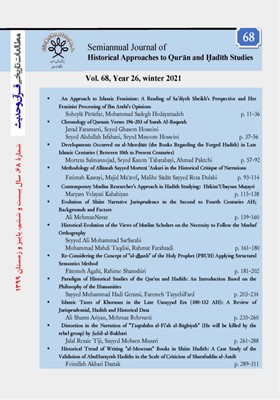Methodology of Allāmah Sayyed Mortezā ‘Askari in the Historical Critique of Narrations
Subject Areas : -fatemeh kasraee 1 , Majid maaref 2 * , Maliha al-Sadat Seyyed Reza Dulabi 3
1 - Ph.D. Student of Quran and Hadith, Usul al-Din University, Tehran, Iran
2 - Professor of the Department of Quran and Hadith, Tehran University, Tehran, Iran .
3 - Assistant Professor of the Department of Quran and Hadith, Usul-e Din University, Tehran, Iran.
Keywords: Narration, Sayyed Mortizā ‘Askari, Internal and external method of Hadith criticism,
Abstract :
Contemporary thinker Sayyed Mortizā ‘Askari, realizing the dangerous harms that the forged hadiths have inflicted on Islam, tried to understand and purify the narrations in various fields such as Sira, Rijal, theology and Quranic sciences. Among the criteria which the contemporary hadith researchers determine for evaluating hadith authenticity, he benefited greatly from the element of reliable history. Through an analytical study of history and with a clear religious insight into the narrations, he revealed the truths that had been hidden from the eyes of many scholars and responded to many questions posed by orientalists and opponents. Reflecting on his works, it is obtained that his method was based on the isnad and content of hadiths. In his method of external criticism; discovering the degree of honesty and truth-seeking of the historian, restoring the narrator's credibility in addition to studying the chain of narrators, validating the book, were the elements which he considered, and in his way of internal critique; consolidation of the text, ensuring the accuracy of the narration, forming the family of the hadith, recognizing the meaning of the words in the narration and paying attention to the evolution of meanings and sectarian prejudices, were taken into account.
_||_

